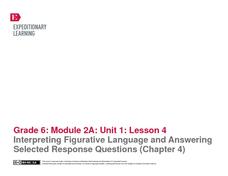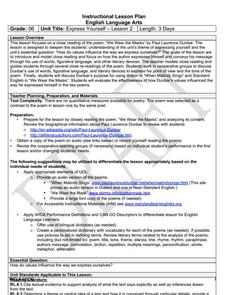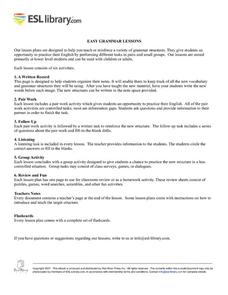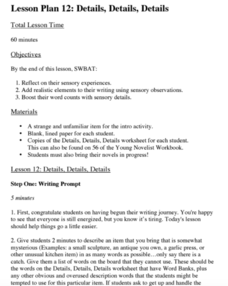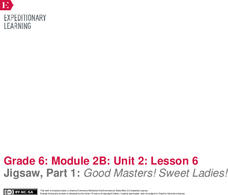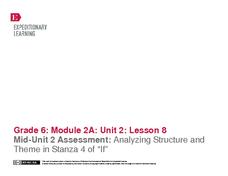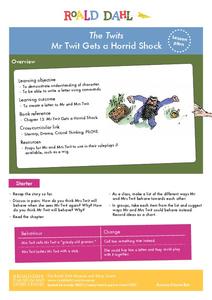EngageNY
Figurative Language and Word Choice: A Closer Look at Bud, Not Buddy (Chapter 2)
The difference between an average and an unforgettable writing can lie in the author's word choice. The figurative language in Chapter 2 of Christopher Paul Curtis's Newbery Medal Winner, Bud, Not Buddy, is the focus of a series of...
Teachers.net
Figurative Language
When is a staple remover a fanged monster? In your ELA classroom when you're teaching this fun figurative language lesson, of course! Get your young writers using figurative language by making a game of it. Give groups a paper bag full...
Achieve3000
Figurative Language
Similes and metaphors make writing more beautiful and detailed, but can be a little harder to decipher during a first reading. Use a passage from The Man Who Loved Words to show young readers how to think through passages that contain...
EngageNY
Interpreting Figurative Language and Answering Selected Response Questions (Chapter 4)
To prepare for an assessment of how well individuals are progressing with their ability to identify and analyze figurative language and its effect on tone and meaning, pairs work through Chapter Four of Christopher Paul Curtis'...
Curated OER
6th Grade: Express Yourself, Lesson 2: Close Read
The second instructional activity of a pair about Paul Laurence Dunbar, this plan focuses in particular on his poem, "We Wear the Masks." After a short historical introduction, class members conduct a series or readings, marking up the...
Roald Dahl
Matilda - Miss Honey and The Trunchbull
As the instructor reads aloud several quotes from five chapters of the story Matilda, class members mime their interpretation of the scenes. Then, after reading "Miss Honey" and "The Trenchbull" (chapters seven and eight), the class...
Curated OER
ESL Grammar Lessons
Practice makes perfect when it comes to learning grammar with this ESL resource. Offering a great way to teach about relative clauses, this lesson engages students with a series of partner, small group, and whole class speaking and...
Curated OER
Reading Poetry in the Middle Grades
Bring the beauty of "Nothing Gold Can Stay" by Robert Frost to middle school language arts. After learners read a copy of the poem, they follow an instructional sequence that focuses on sound, figurative language, and theme.
Curated OER
Lesson Plan: Sensory Exploration
Using their keen eyes and ears, learners build story observation skills which they will use to create sensory detail in their art. They note all of the things they observed on a walk, categorize them by sense, and then use the same skill...
Curated OER
Details, Details, Details
Writing can become one-dimensional if authors don't involve all their senses. First, scholars observe a strange object which, ideally, they can touch and even smell. Without using certain words (you can create a list or have the class...
EngageNY
Jigsaw, Part 1: Good Masters! Sweet Ladies!
Complete a puzzle one piece at a time. Scholars gather in triads to complete jigsaw activities over a monologue from Good Masters! Sweet Ladies. They read as a group and independently and use sticky notes to identify the gist of each...
EngageNY
Looking Closely at Stanza 1—Identifying Rules to Live By Communicated in “If”
Here is a lesson plan in which pupils connect themes and rules to live by from the story Bud, Not Buddy by Christopher Paul Curtis to those found in the poem If by Rudyard Kipling. First, scholars discuss their reading and review Bud's...
EngageNY
Analyzing Structure and Theme in Stanza 4 of “If”
Here is a lesson that provides scholars with two opportunities to stretch their compare-and-contrast muscles. First, learners compare and contrast their experience reading the fourth stanza of If by Rudyard Kipling to listening to the...
Roald Dahl
The Twits - Dirty Beards
The problem with beards is that they collect a lot of food. The first instructional activity in an 11-part unit related to The Twits by Roald Dahl explores the hairy jungle that is Mr. Twit's beard. A concluding project has learners...
Roald Dahl
The Twits - Mr Twit Gets a Horrid Shock
Mr. and Mrs. Twit do not treat each other very nicely. The sixth lesson plan in an 11-part unit designed to accompany The Twits by Roald Dahl explores the way the characters talk to and treat one another. Role play and writing activities...
Curated OER
Genre Lesson: Poetry
Hook kids into a study on poetry elements by asking them to bring in the lyrics to their favorite song. Discuss the elements in one or two songs (preferably that demonstrate rhyme, figurative language, or a repeating phrase). Groups do...
Global Oneness Project
The Importance of Indigenous Language Revitalization
Middle schoolers consider languages as representations of cultures and the importance of preserving various languages, especially the rapidly disappearing languages of indigenous peoples, in a lesson that tells the story of Marie Wilcox...
Learning for Justice
Maya Angelou
Maya Angelou's poem, "Still I Rise", offers young scholars an opportunity to consider how poets use literary devices to create powerful messages. After a close reading and discussion of the poem, class members reflect on how they can...
Scholastic
Frindle Lesson Plan
"Who says a pen has to be called a pen? Why not call it a frindle?" Inspired by this quote from the award-winning novel written by Andrew Celements, this lesson allows children to invent their own terms for common classroom objects,...
Pearson
Catching the Sun: Tales from Asia
Explore the folklore of Asia and the South Pacific with this language arts lesson series. Complementing a reading of Catching the Sun: Tales from Asia by Jan M. Mike, this resource supports learners with understanding cause and effect...
Curated OER
Scary Short Story Writing Lesson
There's nothing like the prospect of writing a scary story to get your middle schoolers' writing juices flowing! In the lesson presented here, pupils listen to scary short stories read to them by the teacher. Then, a discussion ensues...
EngageNY
Looking Closely at Stanza 3—Identifying Rules to Live By Communicated in “If”
Just as Bud, from the novel Bud, Not Buddy by Christopher Paul Curtis, had rules to live by, so does the poem, If by Rudyard Kipling, but how do the two relate? Pupils delve deep into the poem's third stanza, participate in a grand...
Stanford University
Lesson Plan: Montgomery Bus Boycott
Most of us have heard of Rosa Parks, the Montgomery Bus Boycott, and Martin Luther King, Jr. But what about Claudette Colvin, Virginia Durr, Freedom Summer, or the Birmingham Children's Crusade? A five-lesson unit prompts class members...
Roald Dahl
The Twits - The Wormy Spaghetti
What do spiders' legs and an octopus's eyeball have to do with metaphors? The fourth lesson in an 11-part unit designed to accompany The Twits by Roald Dahl uses disgusting foods to teach about metaphoric writing.





